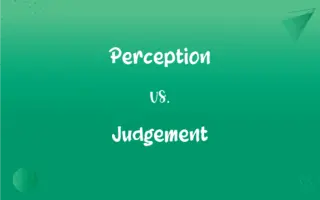Calcium Chloride vs. Magnesium Chloride: What's the Difference?
Edited by Janet White || By Harlon Moss || Published on January 31, 2024
Calcium chloride (CaCl2) is a salt used for de-icing and dust control, while magnesium chloride (MgCl2) is used for similar purposes but is less harsh on the environment.

Key Differences
Calcium chloride, a chemical compound with the formula CaCl2, is known for its high solubility and hygroscopic nature. In contrast, magnesium chloride, MgCl2, also highly soluble, tends to be less hygroscopic. Both are used in de-icing and dust control, but calcium chloride is more effective at lower temperatures.
In terms of industrial applications, calcium chloride is widely used in oil drilling and as a drying agent due to its hygroscopic properties. Magnesium chloride, on the other hand, finds extensive use in the preparation of magnesium metal and as a coagulant in tofu manufacturing. Both are crucial in their respective sectors for their unique properties.
Regarding environmental impact, calcium chloride can be more corrosive to metals and vegetation. Magnesium chloride, while still having some environmental concerns, is generally considered to be more eco-friendly and less damaging. Both, however, require careful handling and application.
In food processing, calcium chloride is often added as a firming agent, particularly in canned vegetables. Magnesium chloride, alternatively, is used as a source of magnesium in mineral supplements. Each plays a unique role in nutritional applications.
In terms of health and safety, calcium chloride can cause skin irritation and is more hazardous upon ingestion. Magnesium chloride is also an irritant, but generally poses less risk to human health. Both compounds necessitate safety precautions during handling and use.
ADVERTISEMENT
Comparison Chart
Chemical Formula
CaCl2
MgCl2
Environmental Impact
More corrosive, harsher on vegetation
Less corrosive, more eco-friendly
Industrial Use
Oil drilling, drying agent
Magnesium production, tofu coagulant
Application in De-icing
Effective at lower temperatures
Less effective at lower temperatures
Health and Safety
Higher skin irritation, more hazardous ingestion
Lower skin irritation, less hazardous ingestion
ADVERTISEMENT
Calcium Chloride and Magnesium Chloride Definitions
Calcium Chloride
Calcium chloride is a white crystalline salt compound.
The roads were treated with calcium chloride to prevent ice formation.
Magnesium Chloride
Magnesium chloride is a hygroscopic salt compound.
Magnesium chloride is spread on roads to control dust.
Calcium Chloride
Calcium chloride is used as a de-icing agent.
Calcium chloride effectively melts ice on sidewalks and driveways.
Magnesium Chloride
It is used in the extraction of magnesium.
The production of magnesium metal often involves the use of magnesium chloride.
Calcium Chloride
Calcium chloride acts as a desiccant to remove moisture.
To keep equipment dry, calcium chloride is used as a desiccant.
Magnesium Chloride
It is less corrosive than other de-icing salts.
Magnesium chloride is preferred for de-icing because it is less damaging to cars.
Calcium Chloride
It serves as a firming agent in food.
Calcium chloride is added to canned vegetables to maintain their firmness.
Magnesium Chloride
Magnesium chloride is used in dietary supplements.
To increase magnesium intake, people may take supplements containing magnesium chloride.
Calcium Chloride
It is highly soluble in water.
Calcium chloride rapidly dissolves in water, making it ideal for moisture control.
Magnesium Chloride
Magnesium chloride serves as a coagulant in tofu making.
Magnesium chloride is added to soy milk to form tofu.
FAQs
How is magnesium chloride used?
Magnesium chloride is used for dust control, in magnesium production, and as a food coagulant.
Is calcium chloride safe for the environment?
While effective, calcium chloride can be harsher on vegetation and more corrosive.
Can magnesium chloride be used in food?
Yes, it's used in food processing, especially as a coagulant in tofu.
What is calcium chloride?
Calcium chloride is a white crystalline salt used in de-icing and as a drying agent.
Is magnesium chloride eco-friendly?
More so than many other de-icing agents, but still requires careful handling.
Is calcium chloride edible?
It's used in food but in small, regulated amounts.
Can calcium chloride melt ice?
Yes, it's very effective at melting ice, even at low temperatures.
What are the environmental concerns with calcium chloride?
Its corrosiveness can affect soil and plant life.
Is calcium chloride harmful to humans?
It can cause irritation and should be handled with care.
How does magnesium chloride affect health?
It's generally safe but can cause skin and eye irritation.
What's the main use of calcium chloride in industries?
It's widely used as a drying agent and in oil drilling.
Is magnesium chloride safe for pets?
Generally, but it's best to limit exposure.
Does magnesium chloride have any industrial applications?
Yes, especially in the production of magnesium metal.
Can calcium chloride be used in food preservation?
Yes, it's often used as a firming agent in canned vegetables.
What are the safety measures for magnesium chloride?
Avoid inhalation and contact with skin or eyes.
Is magnesium chloride a natural compound?
Yes, it occurs naturally in brines and seawater.
How does magnesium chloride compare to calcium chloride in de-icing?
Magnesium chloride is less effective at lower temperatures compared to calcium chloride.
How does calcium chloride affect metal?
It can be corrosive, so caution is needed when used near metals.
Can magnesium chloride be used as a dietary supplement?
Yes, it's a common source of magnesium in supplements.
Can calcium chloride be used in agriculture?
Yes, but with careful consideration of its impact on soil and plants.
About Author
Written by
Harlon MossHarlon is a seasoned quality moderator and accomplished content writer for Difference Wiki. An alumnus of the prestigious University of California, he earned his degree in Computer Science. Leveraging his academic background, Harlon brings a meticulous and informed perspective to his work, ensuring content accuracy and excellence.
Edited by
Janet WhiteJanet White has been an esteemed writer and blogger for Difference Wiki. Holding a Master's degree in Science and Medical Journalism from the prestigious Boston University, she has consistently demonstrated her expertise and passion for her field. When she's not immersed in her work, Janet relishes her time exercising, delving into a good book, and cherishing moments with friends and family.































































